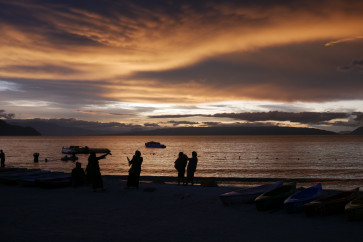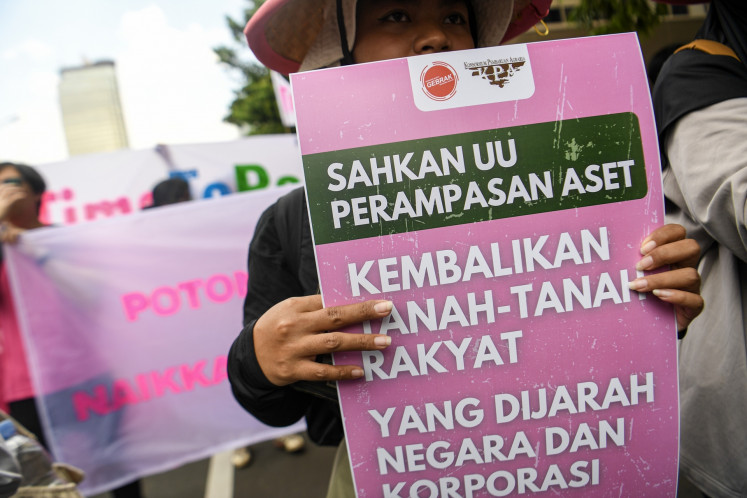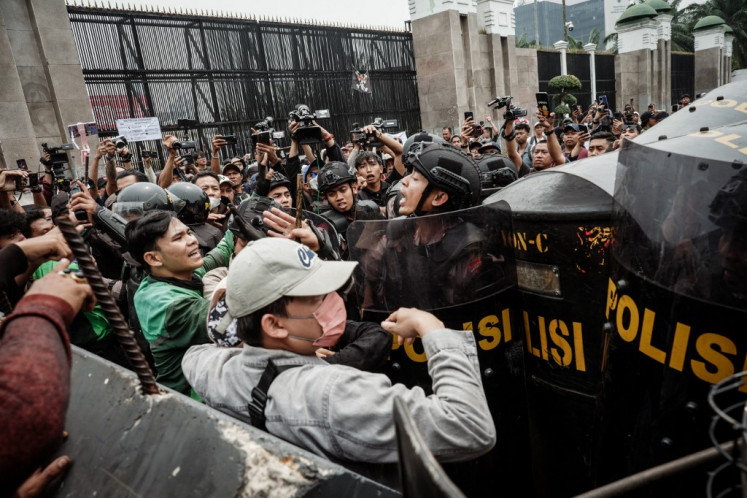Popular Reads
Top Results
Can't find what you're looking for?
View all search resultsPopular Reads
Top Results
Can't find what you're looking for?
View all search resultsEditorial: Haze exporter
With the dry season returning, Indonesia is again doing the routine job of putting out forest and land fires in Sumatra and Kalimantan and defending itself from a barrage of complaints from the people and governments of neighboring countries
Change text size
Gift Premium Articles
to Anyone
W
ith the dry season returning, Indonesia is again doing the routine job of putting out forest and land fires in Sumatra and Kalimantan and defending itself from a barrage of complaints from the people and governments of neighboring countries. The fires seem to be dotted across 25 hotspots in the Sumatra province of Riau.
As usual health problems have been caused by the thick smoke shrouding areas around the hotspots, not to mention flight delays resulting from reduced visibility. In Riau the local government has distributed 2,000 face masks as air quality decreases, while warning schools to suspend learning activities as the situation worsens.
For many years, the disaster has been repeated similarly: in the same provinces and sadly, with similar text-book measures taken to overcome it. For a long time this country has been upholding a fire brigade mentality in coping with annual forest fires by taking action only when the forests are already burning.
Scientists have warned of a cycle of the El Niño phenomenon this year, which means the ongoing drought will be prolonged, and more forest fires will occur, reminiscent of the 1997-1998 disaster that cost Indonesia up to 5 million hectares of forest area as estimated by the Indonesian Forum for the Environment (Walhi).
Indonesia has admitted it cannot deal with the forest fires all alone and therefore finally acceded to the ASEAN Agreement on Transboundary Haze Pollution only 12 years after it was first signed in 2002. The treaty paves the way for national and international cooperation to mitigate the environmental disaster.
An example being what occurred on Tuesday when ministers of five ASEAN member states gathered near the Soekarno-Hatta International Airport in Jakarta to discuss concerted measures to address the haze spilling over from Indonesia's territory.
The agreement is legally binding but, thanks in part to the ASEAN spirit, it lacks instruments to hand down sanctions to any member state that fails to abide by its responsibilities under the agreement. Nor are there any monitoring mechanisms to ensure the agreement is implemented.
As a party to the treaty Indonesia is responsible for explaining to its neighbors the causes of forest fires and actions it has taken in response to the fires. But Indonesia cannot be held accountable for the disaster and its ensuing environmental consequences.
Perhaps this carrot without stick approach answers why the law is not fully enforced against perpetrators of forest fires, be they individuals or corporations. One can expect a light sentence or even acquittal or out-of-court settlement, partly because our law enforcers are neither accustomed to handling environmental crimes nor knowledgeable about environmental legislation.
Due to the adverse impacts of forest fires on both the environment and the whole economy, tough law enforcement will be the most feasible agenda of the government to remove the country's humiliating label as the number one haze exporter and carbon emitter.










